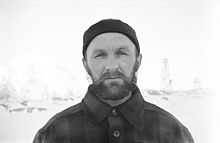Carl R. Eklund
| Carl R. Eklund | |
|---|---|
 Self portrait, Antarctica 1941 | |
| Born |
January 27, 1909 Tomahawk, Wisconsin |
| Died |
November 3, 1962 (aged 53) Philadelphia, Pennsylvania |
| Occupation | Ornithologist |
| Known for | Antarctic exploration, namesake of Eklund Islands |
Carl R. Eklund (January 27, 1909 – November 3, 1962) was a leading American specialist in ornithology and geographic research in both the north and south polar regions.
From 1939-41 he served as ornithologist at the East Base of the U.S. Antarctic Service. This was the first modern US. Government-sponsored expedition to Antarctica, and the third of Rear Admiral Richard E. Byrd's Antarctic commands. In addition to his collection of animal life for the Department of the Interior, Fish and Wildlife Service, Eklund made one of the longest Antarctic dog sled journeys in history, accompanying Finn Ronne. Islands sighted near the turning point of this journey were named the Eklund Islands in his honour by the Board of Geographical Names. [1]
He was appointed as the first Scientific Station Leader of the Wilkes Station, Antarctica.
He received his Ph.D.in zoology and geography from the University of Maryland, and his B.A. from Carleton College. He was a native of Tomahawk, Wisconsin and graduated from Tomahawk High School.
See also
References
- ↑ Siple, Paul (1963). "Obituary: Carl R. Eklund, 1909-1962". Arctic (Arctic Institute of North America) 16 (2): 147–148. Retrieved 2013-01-15.
External links
- Eklund, Carl R. and Ronne, Finn. "Self-published account of the journey of Eklund and Ronne". Retrieved 2013-01-15.
- "USGS biography". Retrieved 2013-01-15.
- "Byrd Antarctic Expedition III 1939-41". Retrieved 2013-01-15.
- "Biography of Carl Eklund". Retrieved January 31, 2013.
|